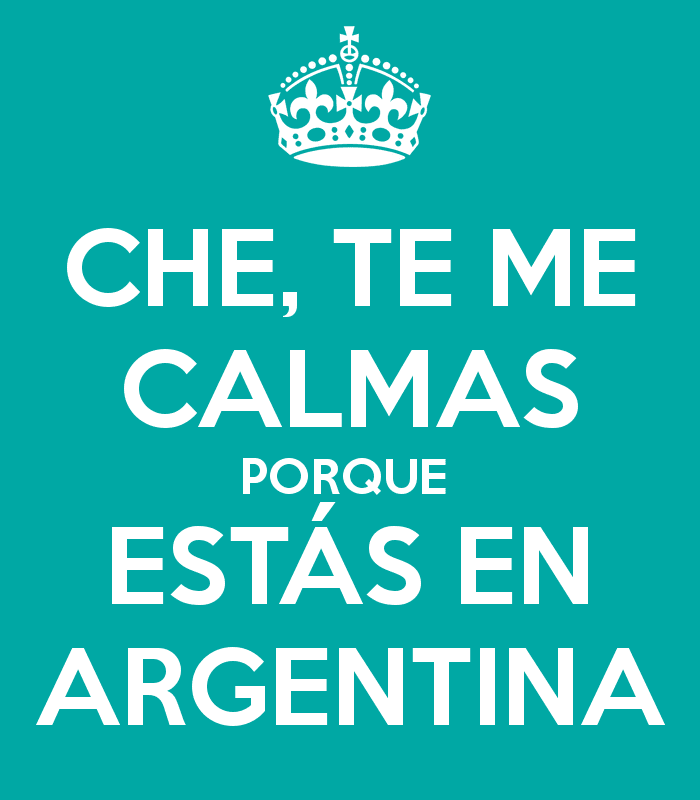“Che, boludo! Todo piola??” Not an uncommon phrase to hear walking along in Buenos Aires. But a lot of those words aren’t proper Spanish. A lot of those words are slang, or “lunfardo”.
Many of the commonly heard words here came from Italian, as did many of the people. About ⅔ of Argentina’s population has Italian roots. When immigrants came over here, they brought their language with them. Lunfardo began as speech in the lower classes in 19th- 20th century and has since then become accepted into everyday speech and spread across Argentina.
With only knowing a few words, it might make a big difference when trying to understand the locals.
So what do you need to know before coming here?
Porteños: This is who you’ll be surrounded by- the locals! A “porteño” is someone from Buenos Aires. Porteños got their name because they live by a port. Port in Spanish is ‘puerto’ and thus, the people there are ‘porteños’.
Che:
This word pretty perfectly translates to “hey”. The difference is they “hey” can translate to “hello”. Whereas, “che” is more of an attention-getter.
Example: “Hey, can you pass me that pencil?” would be “Che, me pasás ese lapiz?”
Dale:
This can be used as an affirmative, or to hurry someone.
Example: “Che, que hacés mañana? Querés ir al cine?” “Dale”
Which would mean, “Hey, what are you doing tomorrow? Do you want to go to the cinema?” “Ok”.
It could be used if someone is taking forever “Estamos tarde! Dale!” — “Were late! Let’s go!”
Boludo:
This is a big one. You’re going to hear “boludo” all over the place. This is a word that everyone uses to call their friends. It actually translates to “idiot”, but it’s not supposed to be taken offensively. It’s just a light way to make fun of your friends.
Example: “Que hacés, boludo?” would literally translate to “What are you doing, idiot?” but really it means “What are you doing, dude?”
Copado:
Cool! Easily one of the most standard words any traveler has to learn in a new environment.
Example: “Ayer fui a la Fuerza Bruta!” “Que copado!” → “Yesterday I went to Fuerza Bruta!” “Cool!”
Boliche:
A nightclub. Boliches in Buenos Aires don’t open until 2 am and usually start closing down around 6:30 or 7 am. You’re sure to be tired the day after going to a boliche.
Posta:
Truth, or that’s accurate. Usually used as a “I agree” statement.
Example: “Este helado es lo mejor” “Posta.”
Quilombo:
This one is fun, and very common. Quilombo is a word to describe that something was “a big mess” so to speak. Originally the term comes from a settlement for escaped slaves from Brazil. Things there were disorganized and chaotic and thus became an adjective in Argentina for something chaotic.
Example: “Ayer, había un accidente en la 9 de Julio. Todos los auto estuvieron parados por 5 horas sin moverse. Fue un quilombo!” — “Yesterday there was an accident on 9 de Julio (a big street here). All the cars were stopped for 5 hours without moving. It was a mess!”
Pibe:
Can be translated to “Guy” or “Dude”
Example: “Este pibe quiere una manzana” → “This guy wants an apple.”
Mina:
The feminine for pibe. Como “esta chica” o “esta mina”
Mango:
Mango does mean what we think of as a mango, like the fruit. But in this case it is synonymous to money. It got it’s start in the late 1800s when the thieves would use the word “marengo” for “bad money” or something “easily won”. Now, in modern day it just translates to money.
Example: “No tengo un mango” → “I don’t have money” or depending on context it could mean “I don’t have a mango (like the fruit)”
Buena Onda:
“Good waves” would be the literal translation and that’s pretty close to the actual translation. It’s more closely translated to “good vibes” but without the hippy connotation. It’s used as slang to say awesome/ cool/ or great!
“Mañana vamos a bailar!” “Que buena onda!”
It’s impossible to describe an entire language in one blog post, but at least now you have a taste of the local language. Argentina’s culture incredibly rooted in its Italian ancestry so it’s only appropriate that the language holds that same sentiment. Maybe this post will be a fun read about another language, or maybe it will ignite the wanderlust to come hear the language for yourself.
By Margo Calhoun




